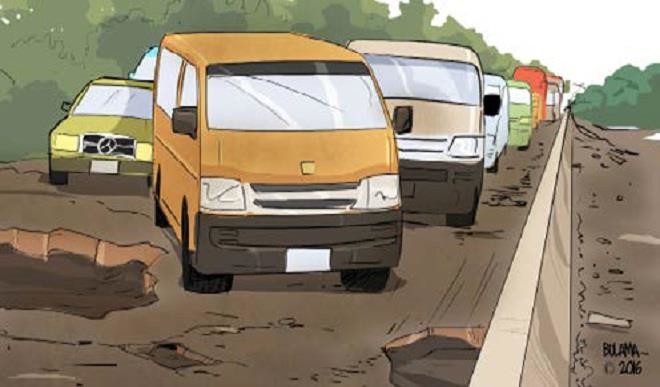My nightmare on Suleja – Minna road
It is said that most of the land in the present day federal capital city of Nigeria, Abuja, was carved out from Niger State, but obviously, the state has not benefitted from its next door neighbour’s federal might in terms of infrastructural development, among other areas. Here again, the main casualty, can be said to […]


It is said that most of the land in the present day federal capital city of Nigeria, Abuja, was carved out from Niger State, but obviously, the state has not benefitted from its next door neighbour’s federal might in terms of infrastructural development, among other areas. Here again, the main casualty, can be said to be the town immediately adjoining the FCT, Suleja, in Niger State.
Some years back I complained after passing through Suleja, Agaie, Lapai to Bida. I also passed through Suleja, Minna to Bida and from Bida to Kutigi, but I sympathise with travelers who have to constantly ply this road and, in fact other roads in Niger State. My recent journey from Suleja to Minna was a terrible experience as far as plying bad roads is concerned. The roads are in need of urgent upgrade by the Federal Roads Management Agency (FERMA), the state and local government authorities combined. The distance between Minna to Kaduna is not far but for lack of a motorable road.
The road from Kaduna through Sarkin Pawa town to Minna from the Kaduna-Abuja express road, has been abandoned due to its bad state. Lack of drainage has allowed erosion to wash away the tar; with the numerous heavy trucks used for logging and firewood trade that ply it adding to its degradation. The road has now become an operational area for armed robbers.
Infact the journey on the relatively motorable Abuja-Kaduna express road to Minna starts from Dikko junction, with motorists sharing a single lane.
After passing the speed breakers along the road in Suleja Local Government, the traveller then comes to long waits at military check points; with notices proclaiming ‘military check point, no phone call’, among others. The long wait offers the youth opportunity to sell table water, soft drinks and snacks, running after one vehicle after the other in the long queue.
Yours faithfully took the path of caution by joining drivers who ply the road on a regular basis and are therefore conversant with its many potholes and zig-zags which they deftly, or is it dangerously, negotiate in their choice car brand, Mazda 323. So I kept quiet and allowed our driver to concentrate as he was on high speed. These drivers know all the big and small potholes; they pick the simple ones and bump onto them by swerving from one lane to the other.
There are many diversions on the road, but there is no signpost indicating such dangerous diversions, which are marked with giant concrete barriers as partitions.
The abandoned express way in Suleja generated tension when a fuel tanker crashed on one side. A fire service truck was brought and stationed on standby, in case of an emergency. The tension was high as the trailer was on the hillside of Suleja which could cause a lot of havoc if it went up in flames.
Meanwhile, in the course of the journey, a siren came blaring with its revolving light flashing and a gun totting mobile police waving his hand for right-of-way in a pilot car, while a luxurious bus was trailing behind, loaded with female passengers. But when they passed, they created a long line of cars behind. But an adventurous commercial driver swerved to the oncoming lane when no car was approaching and overtook the convoy, obviously because he knew the road better.
It is common knowledge that motorists don’t overtake official convoys, they trail behind them especially with the rising security concern in the country, but the daring drivers on this road exploit their better knowledge of the bad road to overtake other over-speeding drivers, both without concern for safety for themselves and other road users.
To ameliorate the situation, some volunteers, popularly called ‘Kunfi Gwamna’ in Hausa language, literally meaning, you are better than the Governor, use sand they collect to fill the potholes, with motorists and passengers doling out some amounts of money to them in appreciation. They erect red flags on sticks to signify to motorists that there are men at work. One of them said they filled the potholes because the roads are in bad shape.
However, the road from Suleja to Gurara is worst compared to that from Paiko to Minna. Commercial drivers move at relatively high speed and overload their vehicles with passengers and goods. To add to the problem, oil tankers and trailers have broken down in the middle of the bad road.
FERMA was visible only near Paiko towards Minna. Similarly, the bad portion of the road did not have the signboard of FERMA.
On my return journey, I saw a long convoy of one of the ‘powerful’ persons in the state with different Sub Urvan Vehicles (SUVs) at Dikko junction. These are the range of vehicles that can easily speed over such dilapidated roads without disturbing the comfort of the important persons they carrying because they are fitted to withstand them.
However, the Suleja-Minna road despite its poor state can still be classified as good when compared to other roads across the state. Others like the Bida to Kutigi and beyond, and the road to Kontagora are said to be death traps.
Lack of roads could be said to hamper free movement and deny rice, yam and fish farmers in the state the chance to transport their products to the market even though they are very close to the federal capital and seat of the central government.
When next you plan to go to Niger State, start early, drive slowly, follow a commercial driver as your guide and if possible have one or more spare tyres.
